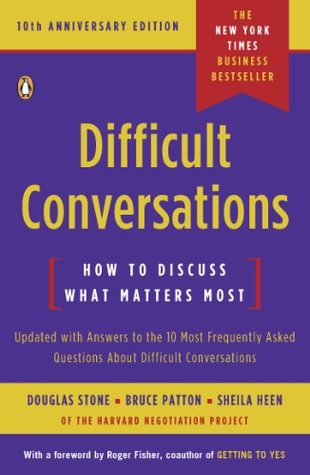More on this book
Community
Kindle Notes & Highlights
Read between
June 22 - July 17, 2020
The point is this: difficult conversations are almost never about getting the facts right. They are about conflicting perceptions, interpretations, and values.
Interpretations and judgments are important to explore. In contrast, the quest to determine who is right and who is wrong is a dead end.
What I think about your intentions will affect how I think about you and, ultimately, how our conversation goes. The error we make in the realm of intentions is simple but profound : we assume we know the intentions of others when we don’t. Worse still, when we are unsure about someone’s intentions, we too often decide they are bad.
But talking about fault is similar to talking about truth — it produces disagreement, denial, and little learning. It evokes fears of punishment and insists on an either/or answer. Nobody wants to be blamed, especially unfairly, so our energy goes into defending ourselves.
When competent, sensible people do something stupid, the smartest move is to try to figure out, first, what kept them from seeing it coming and, second, how to prevent the problem from happening again. Talking about blame distracts us from exploring why things went wrong and how we might correct them going forward. Focusing instead on understanding the contribution system allows us to learn about the real causes of the problem, and to work on correcting them.
difficult conversations do not just involve feelings, they are at their very core about feelings.
Arguing inhibits our ability to learn how the other person sees the world.
Telling someone to change makes it less rather than more likely that they will. This is because people almost never change without first feeling understood.
When we think others have bad intentions toward us, it affects our behavior. And, in turn, how we behave affects how they treat us. Before we know it, our assumption that they have bad intentions toward us has come true.
Focusing on blame is a bad idea because it inhibits our ability to learn what’s really causing the problem and to do anything meaningful to correct it.
Our listening ability often increases remarkably once we have expressed our own strong feelings.
Accept That Feelings Are Normal and Natural.
Recognize That Good People Can Have Bad Feelings.
Friends, neighbors, and bosses will recognize this and begin to see you as someone they can manipulate. When you are more concerned about others’ feelings than your own, you teach others to ignore your feelings too.
In many situations, we are blinded to the complexity of our feelings by one strong feeling that trumps all the others.
the bigger the gap between what we hope is true and what we fear is true, the easier it is for us to lose our balance.
Acknowledge Before Problem-Solving


